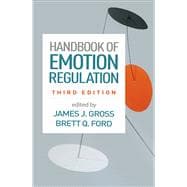This definitive handbook is now in an extensively revised third edition with many all-new chapters and new topics. Leading authorities present cutting-edge knowledge about how and why people try to regulate their emotions, the consequences of different regulatory strategies, and interventions to enhance this key area of functioning. The biological, cognitive, developmental, and social bases of emotion regulation are explored. The volume identifies critical implications of emotion regulation for mental and physical health, psychopathology, educational achievement, prosocial behavior, and other domains. Clinical and nonclinical interventions are critically reviewed and state-of-the-art measurement approaches described.
New to This Edition
*Broader coverage to bring readers up to speed on the ever-growing literature--features 71 concise chapters, compared to 36 in the prior edition.
*Reflects a decade of continuing, rapid advances in theory and research methods.
*New sections on emotion regulation in groups and collectives, specific emotion regulation processes, nonclinical interventions, and emotion regulation across disciplines.
*Increased attention to the role of emotion regulation in culture, and broader societal issues.








